Products are chosen independently by our editors. Purchases made through our links may earn us a commission.
When it comes to moisturizing skincare ingredients, hyaluronic acid tops ingredient lists—and skincare enthusiasts’ minds—as a classic hydrator. But there's another ingredient that has similar thirst-quenching properties, and it's called squalane. Squalane (not to be confused with squalene with an “e”—more on that coming) is used in several skincare formulations and is brimming with beauty benefits. To learn everything there is to know about the ingredient, along with how it differs from squalene, we spoke with Toronto-based, board-certified dermatologist Dr. Geeta Yadav of Skin Science Dermatology.
What is squalane?
To define squalane, it's important to first understand how it differs from squalene (with an “e”). Squalene is a lipid in the skin that makes up about 12% of sebum, i.e. oil. Squalane (with an “a”) is a stabilized, saturated derivative of squalene. "Squalene is less stable than squalane and can oxidize when exposed to free radicals (like UV radiation)," Yadav says. "This can result in squalene peroxide, which can be comedogenic and cause acne." But by converting squalene into squalane, it becomes more shelf-stable, easier to formulate into skincare products, and less likely to clog pores.
As we age, natural squalene production decreases, which can result in rougher and dryer skin, according to Yadav. Incorporating products that contain squalane into your skincare routine can help supplement this and yield softer, more hydrated skin. But how is the ingredient different from other skin hydrators, like hyaluronic acid? While both are naturally occurring, hyaluronic acid is a humectant that helps pull water into the skin while squalane is an emollient that forms a protective barrier on the skin in order to prevent water loss.
How does squalane benefit the skin?
Squalane provides a number of benefits—namely, protecting the skin barrier from moisture loss. "As a lipid, squalane helps restore the moisture barrier and seal in hydration for more nourished skin," Yadav says. By mimicking our skin's natural sebum, the ingredient can help to restore natural oils, particularly for those with dry skin.
These positives apply to more than just skin—squalane can benefit hair and nails, too.
Squalane also comes with antioxidant benefits, serving as a skin protector against UV and other oxidative stress, says Yadav. One study notes that squalane's antioxidant properties can help fight free radical oxidative damage in the skin, which have been linked to the appearance of fine lines, sun spots, and other signs of aging.
Who should use squalane?
Unlike other emollients that may only be suited for dry skin types, squalane is non-comedogenic (meaning it won't clog pores), making it a fine option for those with oily or acne-prone skin. Not only can it provide this skin type with those aforementioned moisturizing, antioxidant benefits, but it can also help “trick” your oily skin into believing that it has enough of its natural oils, which can stabilize sebum production for better-balanced skin.
Those who have a damaged moisture barrier due to either over-exfoliation or inflammatory skin conditions like eczema or psoriasis may benefit from incorporating squalane into their skincare routine, too. "Squalane has anti-inflammatory properties that can be quite soothing on irritated skin, including eczema patches," Yadav says.
How do you look for squalane in skincare products?
Squalane can be harvested from shark livers as well as from plant-based options like olives, rice bran, and sugar cane. If using non-animal-derived products is important to you, look for labels that use language like “vegan” or “100% plant-based” or ones that specifically call out the source of the squalane.
Squalane is available in a variety of skincare products including moisturizers, serums, and cleansers, so how you use it will depend on the product. "I like recommending the use of squalane as a face oil or as a moisturizer, to be applied after cleansing and serum application," Yadav says. Below, find options that you can fit into your skincare routine.
1. For supporting healthy skin: The Ordinary 100% Plant-Derived Squalane
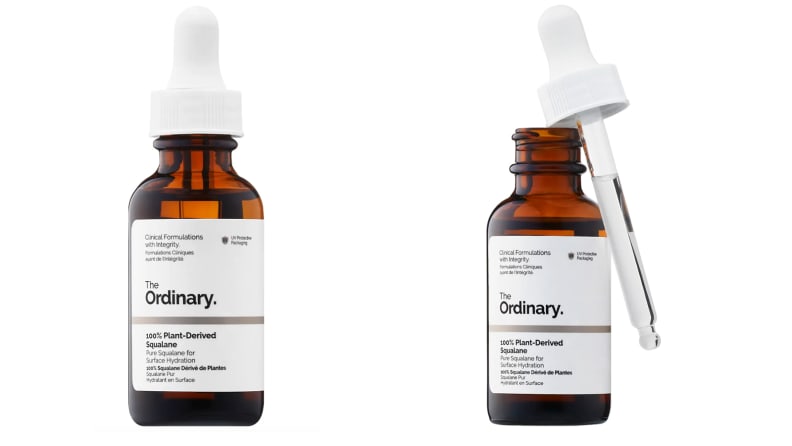
Protect your skin with The Ordinary 100% Plant-Derived Squalane.
A simple way to see how your skin reacts to squalane is adding a serum into your routine that only contains that one active ingredient. Try The Ordinary's 100% Plant-Derived Squalane, which claims to prevent moisture loss for a stronger skin barrier and healthier appearance. You can also apply it to your hair to add moisture and impart shine.
Get The Ordinary 100% Plant-Derived Squalane from Ulta for $9
2. For improving dullness: Biossance Squalane + Vitamin C Rose Oil
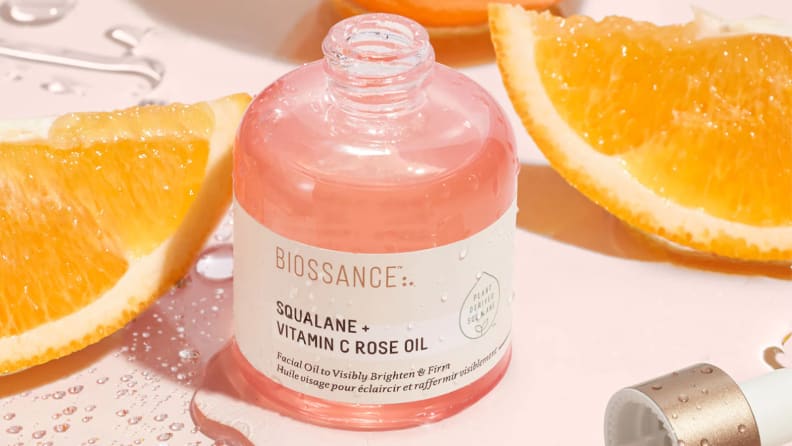
Brighten dull skin with the Biossance Squalane + Vitamin C Rose Oil.
All Biossance products contain sugarcane-derived squalane. This oil combines the moisturizing benefits of squalane with the brightening properties of vitamin C. To use, apply a few drops onto your skin morning and evening after moisturizer to seal in hydration.
Get the Biossance Squalane + Vitamin C Rose Oil from Sephora for $72
3. For strengthening the skin's moisture barrier: Eadem Cloud Cushion Airy Brightening Moisturizer
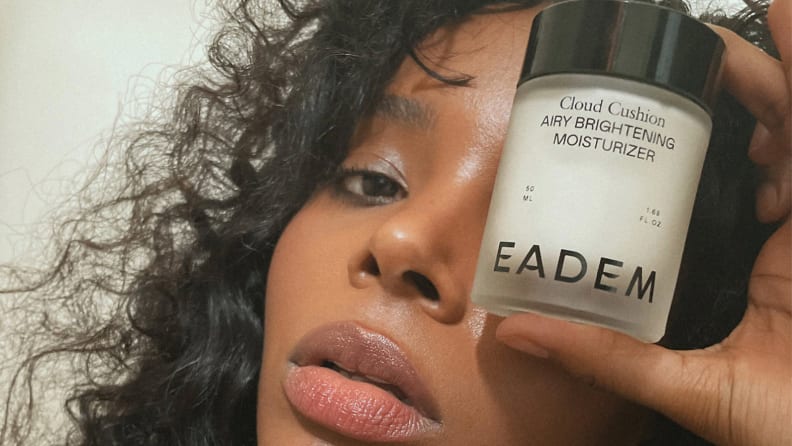
Moisturize your skin with the Eadem Cloud Cushion Airy Brightening Moisturizer.
If you're looking for a velvety-smooth moisturizer that soothes redness and irritation, strengthens your moisture barrier, and deeply hydrates, look to this option from Eadem. Several reviewers say it hydrated their acne-prone skin without leaving behind a greasy residue or feeling heavy. Apply it after cleansing your skin or applying serums in the morning and evening on your face, neck, and decolletage.
Get the Eadem Cloud Cushion Airy Brightening Moisturizer from Sephora for $58
4. For evening the skin tone: Kosas Revealer Skin-Improving Foundation SPF 25
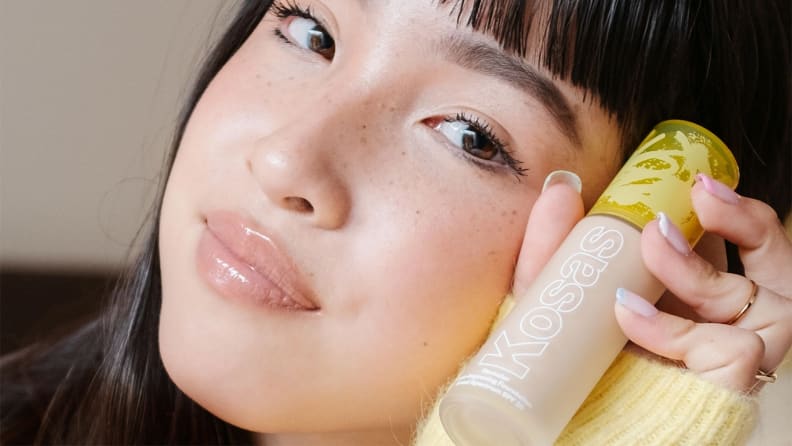
Cover up any imperfections with the Kosas Revealer Skin-Improving Foundation SPF 25.
In addition to being formulated in skincare products, squalane is also an ingredient in some makeup products, including this foundation from Kosas. The formula offers medium coverage and a natural finish, and it contains moisturizing benefits from squalane, peptides, hyaluronic acid, and niacinamide. The foundation is available in 36 shades ranging from very light to rich deep.
Get the Kosas Revealer Skin-Improving Foundation SPF 35 from Sephora for $42
5. For sealing in the skin’s moisture: Peter Thomas Roth Oilless Oil 100% Purified Squalane
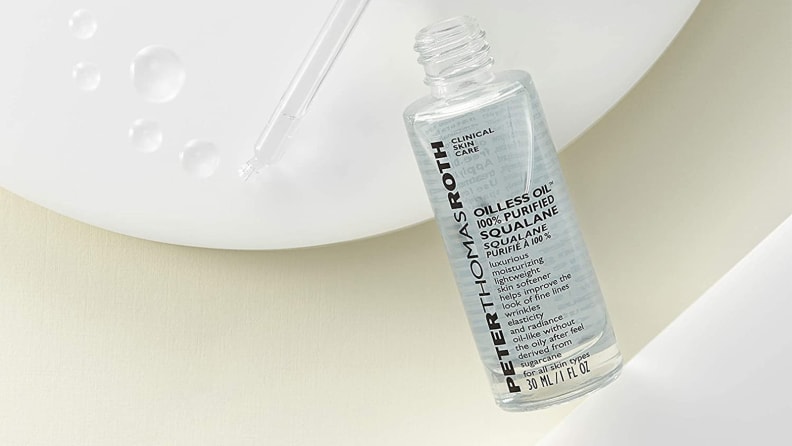
Seal in your skin's moisture with the Peter Thomas Roth Oilless Oil 100% Purified Squalane.
This Peter Thomas Roth formula is great for someone looking to reap the moisturizing, skin-sealing benefits of an oil but bypass the greasiness that can come along with it. It's lightweight, clear, odorless, and derived from sugarcane. The brand recommends using one drop on your face morning and evening in place of moisturizing, and sparingly on other areas of the body, such as the elbows, cuticles, and even on damp or dry hair to prevent moisture loss.
Get the Peter Thomas Roth Oilless Oil 100% Purified Squalane from Amazon for $38
6. For improving skin radiance: Goop GoopGlow Glow Lotion
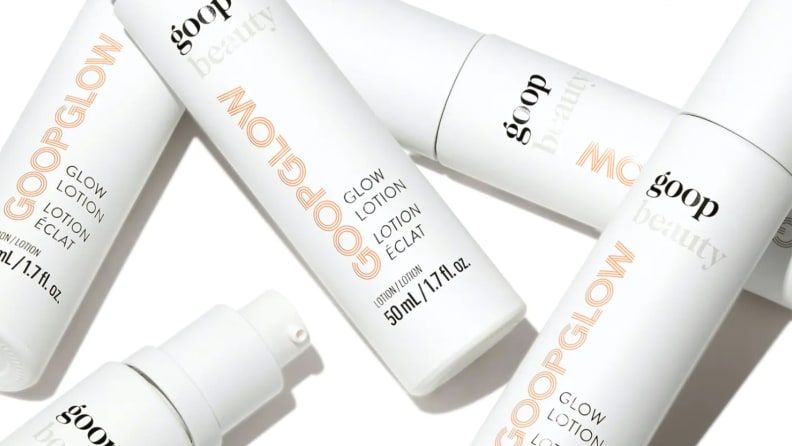
Add a dewy finish to your complexion with the Goop GoopGlow Glow Lotion.
If dewy skin is what you're after, this quick-absorbing glow lotion from Goop will deliver. It claims to fend off signs of aging from environmental aggressors with spirulina enzyme, enhance the skin's glow with vitamin C from a kakadu plum, and improve skin's moisture levels with sugar-derived squalane. Though you’ll like the glowy finish it imparts on the skin for daytime, you can apply two or three pumps in the evening as well.
Get the Goop GoopGlow Glow Lotion from Sephora for $58
Prices were accurate at the time this article was published but may change over time.


